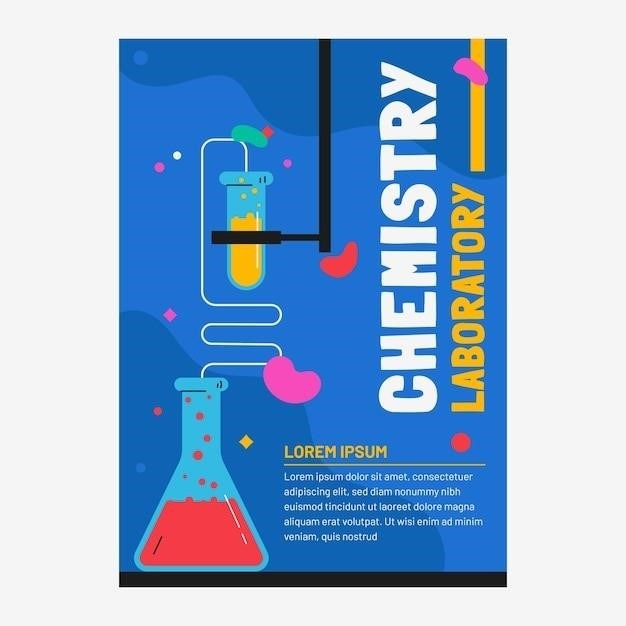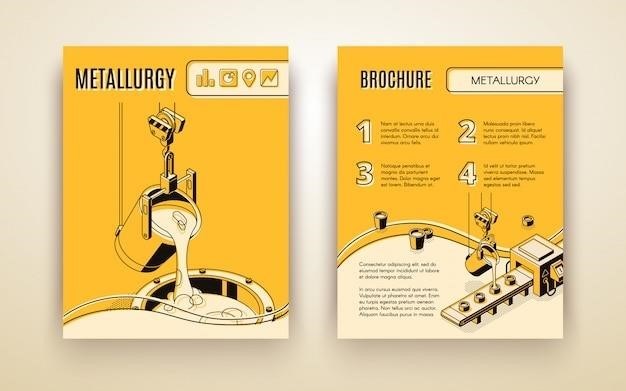Modern Chemistry Textbook Answers⁚ A Comprehensive Guide
This comprehensive guide explores the world of modern chemistry textbook answers, providing insights into their importance, types, and effective utilization. We’ll delve into various resources for finding answers, including online platforms, solution manuals, and educational websites. Additionally, we’ll discuss strategies for maximizing the benefits of textbook answers and address common challenges faced by students.
Introduction
In the realm of academic pursuit, textbooks serve as indispensable companions, providing a structured framework for understanding complex concepts. Modern chemistry textbooks, in particular, are meticulously crafted to deliver a comprehensive overview of chemical principles, theories, and applications. These texts often include a wealth of information, ranging from detailed explanations of scientific phenomena to intricate problem sets designed to solidify students’ understanding. However, navigating the intricacies of chemistry can be a challenging endeavor, and students often find themselves seeking guidance and support to navigate the complexities of textbook problems and exercises.
This is where modern chemistry textbook answers come into play, acting as invaluable resources for students seeking to enhance their comprehension and mastery of the subject. These answers, often presented in PDF format, provide detailed explanations, step-by-step solutions, and insightful insights into the underlying principles behind each problem. By providing a clear path to understanding, modern chemistry textbook answers empower students to overcome obstacles, build confidence, and achieve their academic goals.
The Importance of Textbook Answers
Modern chemistry textbook answers play a pivotal role in the learning process, offering a multitude of benefits that extend beyond simply providing correct solutions. They serve as powerful tools for reinforcing key concepts, enhancing problem-solving skills, and promoting a deeper understanding of the subject matter. Textbook answers act as a bridge between theoretical knowledge and practical application, enabling students to connect abstract principles to real-world scenarios.
By providing detailed explanations and step-by-step solutions, these answers empower students to grasp the underlying logic behind each problem, fostering a sense of confidence and independence in their learning journey. Furthermore, they serve as valuable resources for self-assessment, allowing students to gauge their progress and identify areas where they need further clarification or practice. In essence, modern chemistry textbook answers act as indispensable guides, illuminating the path to mastery and facilitating a deeper understanding of the complexities of chemistry.
Types of Textbook Answers
The realm of modern chemistry textbook answers encompasses a diverse range of formats, each catering to specific learning styles and needs. One common type is the comprehensive solution manual, offering detailed explanations and step-by-step solutions for every problem in the textbook. These manuals provide a thorough understanding of the concepts and techniques involved, making them ideal for students seeking in-depth guidance.
Another type is the answer key, typically found at the back of the textbook or within online resources. Answer keys provide concise answers without extensive explanations, serving as a quick check for self-assessment or as a starting point for deeper exploration. Furthermore, modern chemistry textbooks often incorporate online platforms that offer interactive exercises, simulations, and multimedia resources, providing a dynamic and engaging learning experience. These platforms often include feedback mechanisms and personalized hints, guiding students through challenging problems and fostering a deeper understanding of the subject matter.
Where to Find Modern Chemistry Textbook Answers
In the digital age, finding modern chemistry textbook answers is easier than ever. A plethora of online resources are available, providing students with access to solutions, explanations, and interactive learning tools. One popular option is educational websites, such as Chegg, Course Hero, and Slader, which offer vast libraries of textbook solutions and study guides. These platforms allow students to search for specific problems or browse through entire chapters, providing a comprehensive resource for tackling challenging assignments. Another valuable resource is the textbook’s accompanying solution manual, which often provides detailed explanations and step-by-step solutions for every problem in the textbook. These manuals are particularly helpful for students seeking in-depth guidance and a deeper understanding of the subject matter. Additionally, many publishers offer online platforms that complement their textbooks, providing interactive exercises, simulations, and multimedia resources, enriching the learning experience and fostering engagement.
Online Resources
The internet has revolutionized access to knowledge, and chemistry textbook answers are no exception. Numerous online resources cater to students seeking assistance with their studies. One popular platform is Chegg, a website that offers a vast library of textbook solutions, study guides, and expert Q&A forums. Students can search for specific problems or browse through entire chapters, accessing detailed explanations and step-by-step solutions. Another valuable resource is Course Hero, a website where students can share and access study materials, including textbook solutions, notes, and practice problems. Course Hero’s community-driven approach provides a collaborative learning environment where students can connect with peers and seek support. Additionally, websites like Slader offer a wide range of textbook solutions, organized by chapter and problem number, providing students with readily available answers and explanations. These online resources empower students to learn at their own pace, access information anytime, anywhere, and enhance their understanding of complex chemical concepts.
Textbook Solution Manuals
Textbook solution manuals offer a structured and comprehensive approach to understanding chemistry concepts. These manuals, often published by the same publisher as the textbook, provide detailed solutions to every problem in the textbook. They serve as a valuable resource for students who struggle with specific problems or want to verify their understanding. Solution manuals typically present a step-by-step breakdown of each problem, outlining the necessary equations, concepts, and calculations. This detailed approach helps students grasp the underlying principles and develop problem-solving skills. While solution manuals can be a valuable tool, it’s crucial to use them responsibly. Students should strive to understand the concepts themselves before relying solely on the solutions. Solution manuals should serve as a supplement to studying, providing clarification and guidance when needed. By using solution manuals effectively, students can gain a deeper understanding of chemistry and develop the confidence to tackle more complex problems independently.

Educational Websites
Educational websites provide a vast and accessible resource for finding modern chemistry textbook answers. These platforms offer a plethora of information, including practice problems, solutions, explanations, and interactive learning tools. Some websites specialize in specific chemistry topics, while others provide comprehensive coverage across the subject. For example, websites like Khan Academy, Chegg, and Study.com offer a wide range of chemistry resources, including video lectures, practice quizzes, and step-by-step solutions. These websites are often designed to complement textbooks, providing additional context, examples, and practice opportunities. Students can use these platforms to reinforce their understanding of concepts, explore challenging topics, and prepare for exams. Moreover, many educational websites allow users to interact with other learners and educators, creating a collaborative learning environment. This fosters a sense of community and provides students with access to diverse perspectives and insights. When utilizing educational websites, it’s essential to evaluate the reliability and credibility of the information presented. Look for websites affiliated with reputable educational institutions or organizations, and verify the accuracy of information by cross-referencing it with other sources. By leveraging the vast resources available on educational websites, students can enhance their understanding of chemistry and achieve academic success.
Tips for Using Textbook Answers Effectively
While textbook answers can be invaluable tools for learning and understanding chemistry, it’s crucial to use them effectively to maximize their benefits. Avoid simply copying answers without comprehending the underlying concepts. Instead, treat answers as stepping stones to deepen your understanding. Begin by attempting problems independently. If you encounter difficulties, consult the answer to identify where you went wrong. Analyze the solution process, focusing on the steps taken, the reasoning behind each step, and the underlying principles. Don’t just memorize the answer; strive to understand the logic and apply it to similar problems. Engage in active learning by asking yourself questions as you review the answer. What are the key concepts involved? How do these concepts relate to other topics you’ve learned? Can you apply this solution to a different scenario? By actively questioning and analyzing the answers, you’ll transition from passive consumption to active learning. Furthermore, utilize answers as a springboard for further exploration. If an answer piques your curiosity, delve deeper into the topic by researching additional resources, conducting experiments, or engaging in discussions with peers or instructors. Remember, textbook answers are not meant to be crutches but rather tools to aid in your learning journey. By using them effectively, you can transform them from mere solutions to catalysts for deeper understanding and intellectual growth.
Common Challenges and Solutions
While modern chemistry textbook answers offer valuable support, students often encounter challenges in utilizing them effectively. One common hurdle is finding reliable and accurate answers. The abundance of online resources can make it difficult to discern trustworthy sources. To address this, prioritize reputable platforms like educational websites, publishers’ official websites, and academic databases. Beware of websites offering “free” answer keys, as they may contain errors or be outdated. Another challenge lies in understanding the solution process presented in textbook answers. Students may struggle to follow the steps, comprehend the reasoning behind them, or apply the concepts to different problems. To overcome this, focus on actively engaging with the answer. Break down the solution into smaller steps, identify the key concepts involved, and relate them to your textbook material. If you’re still unclear, seek clarification from your instructor or a tutor. Finally, some students may rely too heavily on answers, neglecting independent problem-solving. This can hinder their learning and development of critical thinking skills. To avoid this trap, strive for a balanced approach. Attempt problems independently first, using answers as a guide when necessary. Focus on understanding the underlying concepts rather than memorizing solutions. By addressing these challenges and embracing a proactive approach, you can transform textbook answers into powerful tools for learning and understanding modern chemistry.
In conclusion, modern chemistry textbook answers serve as valuable resources for students seeking to deepen their understanding and enhance their learning experience. While they provide detailed explanations and solutions, it is crucial to approach them strategically to maximize their benefits; Remember to use textbook answers as a tool for learning, not a crutch. Focus on understanding the underlying concepts and problem-solving techniques rather than simply memorizing solutions. By adopting a balanced approach and addressing the challenges associated with using textbook answers effectively, students can unlock their full potential in mastering the complexities of modern chemistry. Embrace the opportunity to delve deeper into the subject matter, develop critical thinking skills, and enhance your overall learning journey. The world of chemistry is vast and intricate, and with the right guidance and resources, you can navigate it with confidence and success.







